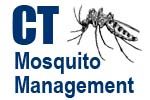Mosquito Control Around the Home
The best way to manage mosquitoes around the home is to eliminate standing water where mosquitoes can lay eggs.
- Flush birdbaths and wading pools weekly.
- Swimming pool filtering systems should be maintained and in good working order.
- Abandoned pools should be drained, filled, or "shocked" with pool chemicals.
- Openings for standing water sources (septic tanks, roof gutters, rain barrels) can be sealed or covered with screening.
- Rotten stumps and tree holes can be filled with sand.
- Discarded tires should be disposed of properly or holes (0.5 inches or larger) can be drilled in the bottom of the tires to drain water. Tires can also be stacked and covered to prevent rainwater from entering.
- Remove any artificial containers that hold water (e.g., wheelbarrows, pails, paint cans, etc.).
- Water lawns and gardens minimally to prevent puddling.
- Change water in ornamental pools and aquatic gardens or install an aerator. You can stock minnows, such as Gambusia, koi, or guppies, as a natural biological control. Fish can be brought indoors for winter or restocked annually. (Please note that large pond stocking with non-native fish or releasing fish into public waters is prohibited.)
The Connecticut Public Health Code prohibits homeowners from creating or maintaining sources of mosquitoes on their property. Violators are subject to enforcement actions by their local health department.
Insecticides, such as those containing the bacteria Bacillus thurgiensis var. israelensis (Bti), are available at many nurseries and garden supply centers and can be used to treat mosquito breeding sites. In general, natural ponds and lakes are not sources of mosquito breeding because permanent bodies of water usually contain fish and other predators that would consume mosquito larvae.
Personal Precautions
Mosquitoes prefer to rest in shady, calm areas and will avoid more open sunny, breezy areas. Mowing tall grass will reduce places where mosquitoes can rest. Mosquitoes are most active around dawn and dusk although some, such as the common saltmarsh mosquito, may be active throughout the day or during cloudy, humid weather. Simply avoiding outdoor activity during these peak mosquito times can minimize contact with mosquitoes.
To reduce the chance of being bitten when outside, wear protective clothing such as long sleeves, long pants, and head cover. Light-colored, loose-fitting clothing is preferable because dark clothing radiates more heat and attracts more mosquitoes. Insect repellents containing DEET, picaridin, IR3535, or oil of lemon eucalyptus can be used by most people and are often effective for varying lengths of time. Permethrin, a synthetic pyrethroid that is widely available for repelling and killing ticks, also repels and kills mosquitoes. It is applied to clothing and provides longer-lasting protection. Do not apply permethrin products directly to the skin. Although not marketed as repellents, there are several cosmetic liquids and creams that claim some level of mosquito repellency. These products may effectively repel when mosquito pressure is light, but need to be reapplied frequently. The U.S. Environmental Protection Agency (EPA) provides further information on the use and effective use of repellents.
To reduce mosquito infestations in the house, maintain screens over doors and windows. A porch or deck also can be enclosed with screening. Outside light use should be reduced and yellow light bulbs used when possible.
Homeowners may also consider spraying pesticides labeled for mosquito control to shade trees, hedges, and shrubs adjacent to foundations, fences, and stone walls where adult mosquitoes are most likely to light. Several over-the-counter aerosol sprays that homeowners can use to control mosquitoes are available. Always read and follow the label instructions. Private, CT-certified applicators can also be hired to treat yards and neighborhoods. Make sure the applicator is certified in the "Mosquito and Biting Fly" category (cat. 7f) by the CT DEEP Pesticide Management Program. (Businesses Registered to Perform Mosquito Control in Connecticut)
Precautions for Domestic Animals
EEE and WNV can be fatal to horses. Horse owners are strongly encouraged to protect their horses from EEE and WNV by inoculation. Canine heartworm (filariasis) is a fatal disease circulated in dogs by biting mosquitoes. The DEEP, CAES, or DPH do not monitor for heartworm in mosquitoes. Dog owners are encouraged to protect their pets from canine heartworm by administering preventative medications obtained through their veterinarian.
Managing Mosquitoes Using Insecticides
Mosquito Control Using Water Management
Public Service Announcements (informational videos)
Content last updated April 2, 2020.

